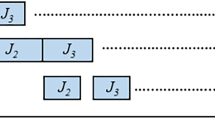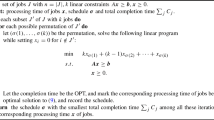Abstract
Sequencing problems arise in the context of process scheduling both in isolation and as subproblems for general scenarios. Such sequencing problems can often be posed as an extension of the Traveling Salesman Problem. We present an exact parallel branch and bound algorithm for solving the Multiple Resource Constrained Traveling Salesman Problem (MRCTSP), which provides a platform for addressing a variety of process sequencing problems. The algorithm is based on a linear programming relaxation that incorporates two families of inequalities via cutting plane techniques. Computational results show that the lower bounds provided by this method are strong for the types of problem generators that we considered as well as for some industrially derived sequencing instances. The branch and bound algorithm is parallelized using the processor workshop model on a network of workstations connected via Ethernet. Results are presented for instances with up to 75 cities, 3 resource constraints, and 8 workstations.
Similar content being viewed by others
References
G.L. Nemhauser and L.A. Wolsey, Integer programming, in:Handbooks in Operations Research and Management Science: Vol. 1: Optimization (North-Holland, New York, 1989) pp. 447–528.
R.F.H. Musier and L.B. Evans, Batch process management, Chem. Eng. Progress 86(1990)66–77.
G.V. Reklaitis, Perspectives on scheduling and planning of process operations, presented at the4th Int. Symp. on Process Systems Engineering, Montebello, Canada (1991).
J.F. Pekny, D.L. Miller and G.J. McRae, An exact parallel algorithm for scheduling when production costs depend on consecutive system states, Comp. Chem. Eng. 14(1990)1009–1023.
J.F. Pekny and D.L. Miller, Exact solution of the no-wait flowshop scheduling problem with comparison to heuristic methods, Comp. Chem. Eng. 15(1991)741–748.
D.L. Miller and J.F. Pekny, Exact solution of large asymmetric traveling salesman problems, Science 251(1991)754–761.
N. Shah, C.C. Pantelides and R.W.H. Sargent, Efficient solution techniques for optimal scheduling of batch operations, Centre for Process Systems Engineering, Imperial College of Science, Technology and Medicine, London SW7 2BY, UK (1991).
J.F. Pekny, D.L. Miller and G.K. Kudva, An exact algorithm for sequencing with resource constraints with application to production scheduling with aggregate deadline, Comp. Chem. Eng., in press.
M.R. Garey and D.S. Johnson,Computers and Intractability: A Guide to the Theory of NP-Completeness (W.H. Freeman, 1979).
E. Balas, The prize collecting traveling salesman problem, Management Science Research Report No. MSRR-539, Carnegie Mellon University, Pittsburgh, PA (July 1987).
T. Ibaraki, Enumerative approaches to combinatorial optimization — I and II, Ann. Oper. Res. 10(1988).
J.F. Pekny and D.L. Miller, A parallel branch and bound algorithm for solving large asymmetric traveling salesman problems, Math. Progr. (1991).
S. Martello and P. Toth, Linear assignment problems, Ann. Discr. Math. 31(1987)259–282.
E. Balas, D.L. Miller, J.F. Pekny and P. Toth, A parallel shortest augmenting path algorithm for the assignment problem, ACM 38(1991)985–1004.
M. Padberg and G. Rinaldi, An efficient algorithm for the minimum capacity cut problem, Math. Progr. 47(1990)19–36.
E. Balas, Facets of the knapsack polytope, Math. Progr. 21(1975)146–164.
R. Aboudi and K. Jornsten, Resource constrained assignment problems, Discr. Appl. Math. 26(1990)175–191.
G.L. Nemhauser and L.A. Wolsey,Integer and Combinatorial Optimization (Wiley Interscience, 1988).
H. Crowder, E. Johnson and M. Padberg, Solving large-scale zero—one linear programming problems, Oper. Res. 31(1983)803–834.
R.E. Tarjan,Data Structures and Network Flow Algorithms, SIAM Regional Conference Series in Applied Mathematics (1983).
R.E. Gomory and T.C. Hu, Multi-terminal network flows, J. Soc. Ind. Appl. Math. 9(1961)551–570.
Author information
Authors and Affiliations
Rights and permissions
About this article
Cite this article
Kudva, G.K., Pekny, J.F. A distributed exact algorithm for the multiple resource constrained sequencing problem. Ann Oper Res 42, 25–54 (1993). https://doi.org/10.1007/BF02023171
Issue Date:
DOI: https://doi.org/10.1007/BF02023171




